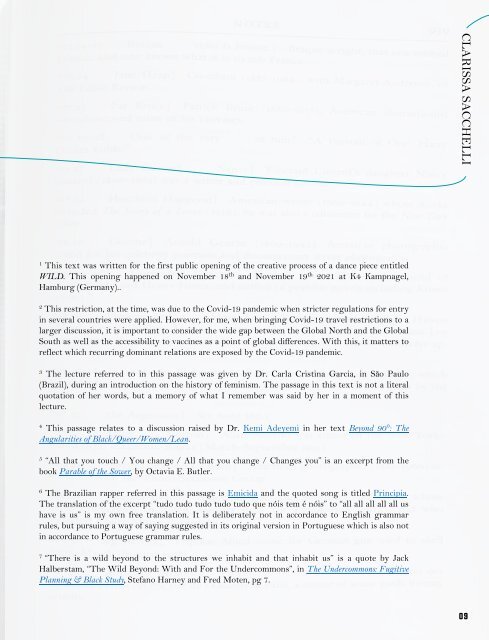K3 MAGAZIN #14
Clarissa Sacchelli ist eine Künstlerin, die im und über den Tanz arbeitet und hat eigene choreographische Projekte zwischen Tanz, Performance, Publikationen und Pädagogik entwickelt. Ihre Praxis ist geprägt von der Erfahrung, überwiegend im lateinamerikanischen Kontext zu leben und zu arbeiten. Sie war im K3 Residenzprogramm in der Spielzeit 2021/2022. Für die 14. Ausgabe des K3 Magazins reflektiert Clarissa gemeinsam mit Kooperationspartner*innen ihr Stück WILD, welches sie im Rahmen der Residenz entwickelt hatte.
Clarissa Sacchelli ist eine Künstlerin, die im und über den Tanz arbeitet und hat eigene choreographische Projekte zwischen Tanz, Performance, Publikationen und Pädagogik entwickelt. Ihre Praxis ist geprägt von der Erfahrung, überwiegend im lateinamerikanischen Kontext zu leben und zu arbeiten. Sie war im K3 Residenzprogramm in der Spielzeit 2021/2022. Für die 14. Ausgabe des K3 Magazins reflektiert Clarissa gemeinsam mit Kooperationspartner*innen ihr Stück WILD, welches sie im Rahmen der Residenz entwickelt hatte.
Create successful ePaper yourself
Turn your PDF publications into a flip-book with our unique Google optimized e-Paper software.
CLARISSA SACCHELLI<br />
1<br />
This text was written for the first public opening of the creative process of a dance piece entitled<br />
WILD. This opening happened on November 18 th and November 19 th 2021 at K4 Kampnagel,<br />
Hamburg (Germany)..<br />
2<br />
This restriction, at the time, was due to the Covid-19 pandemic when stricter regulations for entry<br />
in several countries were applied. However, for me, when bringing Covid-19 travel restrictions to a<br />
larger discussion, it is important to consider the wide gap between the Global North and the Global<br />
South as well as the accessibility to vaccines as a point of global differences. With this, it matters to<br />
reflect which recurring dominant relations are exposed by the Covid-19 pandemic.<br />
3<br />
The lecture referred to in this passage was given by Dr. Carla Cristina Garcia, in São Paulo<br />
(Brazil), during an introduction on the history of feminism. The passage in this text is not a literal<br />
quotation of her words, but a memory of what I remember was said by her in a moment of this<br />
lecture.<br />
4<br />
This passage relates to a discussion raised by Dr. Kemi Adeyemi in her text Beyond 90°: The<br />
Angularities of Black/Queer/Women/Lean.<br />
5<br />
“All that you touch / You change / All that you change / Changes you” is an excerpt from the<br />
book Parable of the Sower, by Octavia E. Butler.<br />
6<br />
The Brazilian rapper referred in this passage is Emicida and the quoted song is titled Principia.<br />
The translation of the excerpt “tudo tudo tudo tudo tudo que nóis tem é nóis” to “all all all all all us<br />
have is us” is my own free translation. It is deliberately not in accordance to English grammar<br />
rules, but pursuing a way of saying suggested in its original version in Portuguese which is also not<br />
in accordance to Portuguese grammar rules.<br />
7<br />
“There is a wild beyond to the structures we inhabit and that inhabit us” is a quote by Jack<br />
Halberstam, “The Wild Beyond: With and For the Undercommons”, in The Undercommons: Fugitive<br />
Planning & Black Study, Stefano Harney and Fred Moten, pg 7.<br />
09


